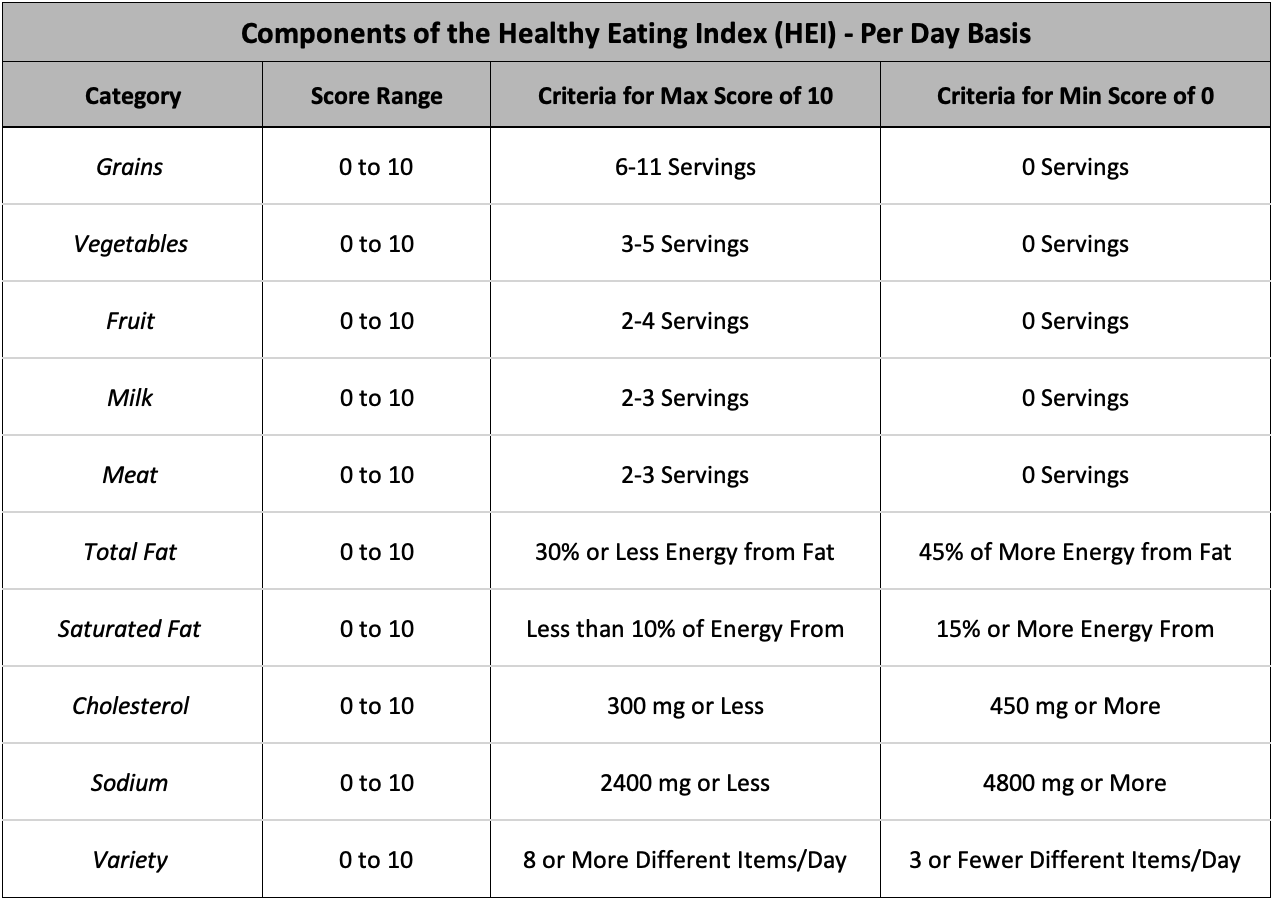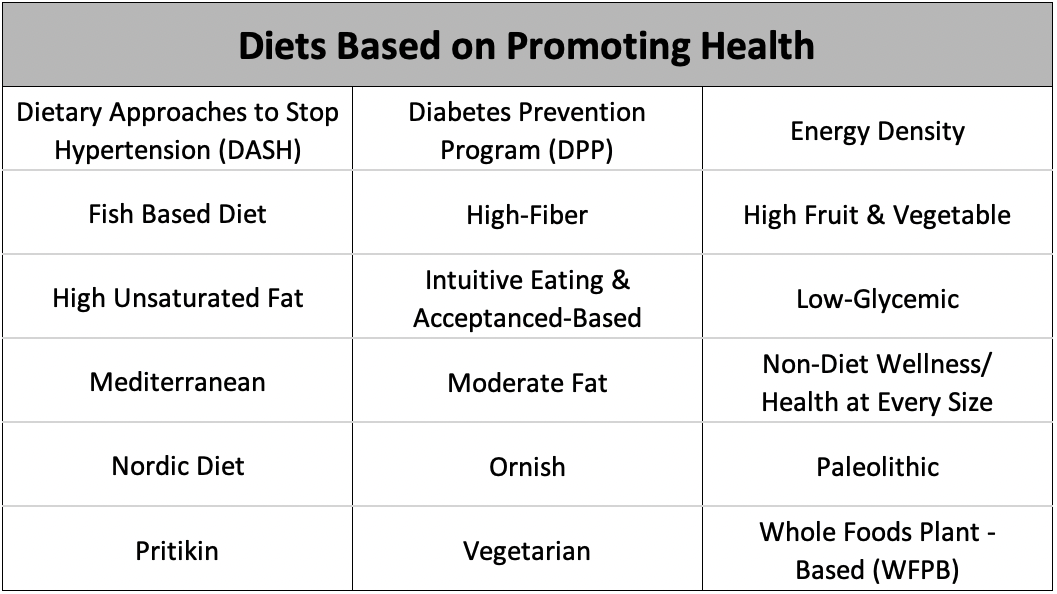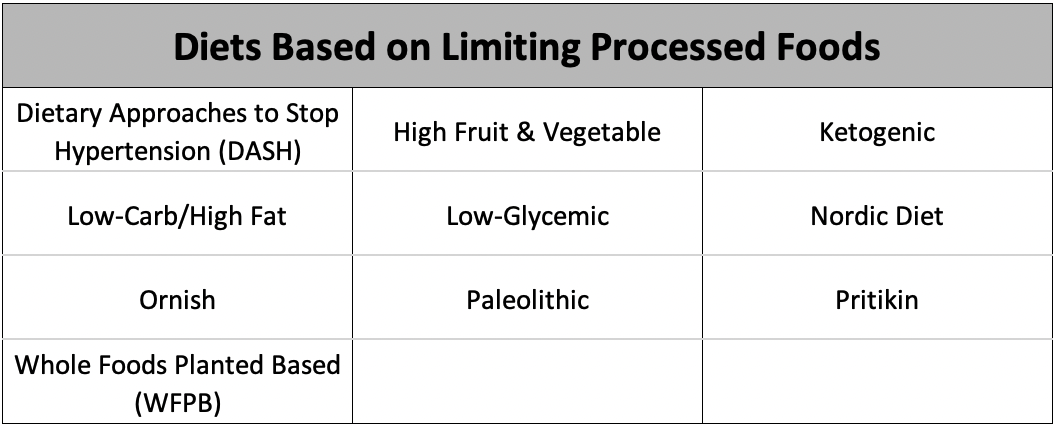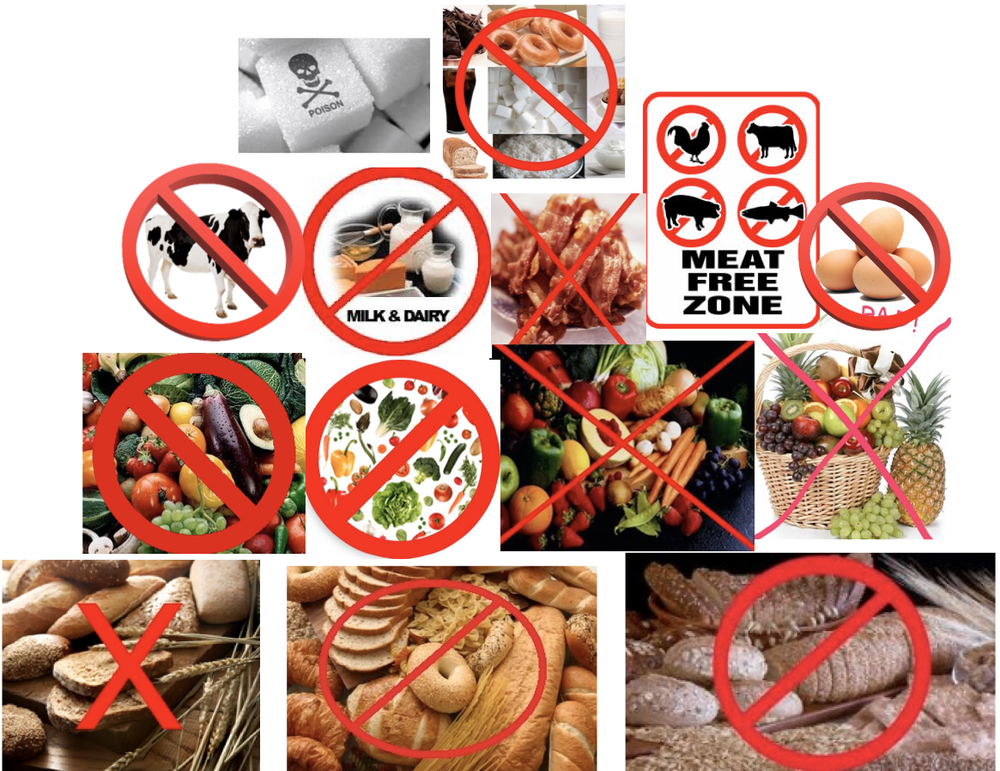Why You Should Choose Between Eating Healthy OR Losing Weight

Losing weight requires the absence of calories, not the presence of nutrients. Yet, the vast majority of weight loss diets encourage you to cut calories AND eat healthier to lose weight. Of the seven categories that all diet types fit into (macronutrient, health, timing, limit processing, calorie restriction, behavior modification, hunger, and physiology), some explicitly state that you eat for health (Table 1 – Health, Table 2 – Limit Processing), while the others simply imply it.
Table 1. Diets Based on Promoting Health.
Table 2. Diets Based Upon Limiting Processed Foods.
I have a number of problems with trying to cut calories AND eat healthier, but I will start with the fact that
- No One Can Agree on What Constitutes Healthy in the First Place: The Food Guide Pyramid, Choose MyPlate, and The Dietary Guidelines for Americans are, for the most part, accepted as being healthy by most nutrition professionals. But clearly not everyone agrees.
The Atkins Diet, High Fat Diets, High-Protein Diets, and Ketogenic Diets most definitely are not healthy when judged through the lens of The Dietary Guidelines for Americans or through the dozen or so scientific rubrics utilized to measure diet quality, yet they are immensely popular weight loss diets.
At the moment, the only universally accepted villain is added sugar. Every other food group is either a hero or a villain depending on what type of diet you follow. To illustrate this point, I once wrote a posted titled, Everything You Eat Will Kill You, and created a food guide pyramid out of all the foods that various people forbid you from eating for one reason or another (Figure 1).
Figure 1. Eating by the USDA Food Guide Pyramid will Purportedly Kill You. You can fill the entire Food Guide Pyramid with the foods that will kill or at the very least harm your health.
To most consumers, “eating healthy” is some vague concept that they have kaleidoscoped together in their heads from all the factoid and tidbit marketing buzzwords they have been drowned in over the years. Eating healthy no longer has any meaning. One man’s trash is another man’s treasure when it comes to what you “can” and “cannot” eat on various diets.
- It is Easier to Improve Your Health Through Weight Loss than By Eating Healthier: if you have obesity or type II diabetes, your problem isn’t due to a lack of nutrients (diet quality) it is due to excess stores of fuel (body fat & carbohydrate stored as glycogen). Reducing these excess fuel stores through either caloric restriction or exercise has been shown to increase your metabolic health within days and even hours.
On the other hand, it will generally take months, years, and even decades to see the positive benefits of a good diet or the negative side effects of a poor diet. Meal timing, eating low glycemic foods, fat, and fiber can all help control blood glucose in the immediate short-term, but that doesn’t meaningfully change the metabolic environment of your body contributing to your poor health, namely, excess body fat, a fatty liver, high glycogen content, and poor metabolic flexibility. Adding nutrients to your diet is not your problem, nor your solution.
The media, marketers, and even professionals have drastically overblown the benefits of nutrition and have either overstated the fear of your diet being inadequate (i.e., a deficiency) or exaggerated the benefits you could reap from maximizing the number of nutrients you take in. For example, there is no clear (mortality) benefit to eating 15 servings of fruits and vegetables/day as opposed to just 5.
Even if you have “the most nutritious, healthiest diet in the world” if you have obesity, the metabolic environment caused by your fat stores will still cause you to be unhealthy. Good nutrition doesn’t change this. Conversely, even if your diet stinks (i.e., McDonalds for weight loss, ice cream diet, potato diet), running a calorie deficit and losing weight will lead to a metabolic improvement.
- Diet Quality (Eating Healthy) Does Not Matter for Weight Loss: nutrition professionals will find such a statement repulsive, blasphemous, and expulsion worthy but diet quality really does not matter to weight loss. I have looked at every food or nutrient’s effect on weight loss and with the exception of a few studies, individual nutrients prove to have very little, if any, effect on weight loss.
Nutrition dogma states that diet quality AND quantity (calories) matter to weight loss, yet there is very little evidence linking diet quality and weight loss. Even in the study I just hyperlinked to’s results are thoroughly unimpressive – which I talked about on a recent podcast. There are many rubrics to assess diet quality but let’s look at the Healthy Eating Index (HEI) as an example. The HEI grades a diet from 0-100 with 100 being the best possible score (Table 3).

Table 3. Components of the Healthy Eating Index (HEI). There are ten categories rated on a 0-10 basis with 0 being the worst score and 10 being the best. Scoring is done on a sliding scale; however, the criteria for the best and worst possible scores are listed above. Figure adapted from Kennedy, E; 2008, ASIA J PAC J CLIN NUTR
Some popular weight loss diets have a terrible diet quality score yet lead to meaningful short term weight loss. For example, when assessing the Atkins and Ketogenic (Keto) diets with the HEI, they are both going to eliminate grains (0 points), fruits (0 points), have way too much fat (0 points) and saturated fat (0 points), and a limited variety (0 points).
This leaves vegetables, milk, meat, cholesterol, and sodium to score points. It’s possible to fit in vegetables and some dairy but it is also likely that too much cholesterol will be consumed (comes from animal products). The only category to really score points in is meat (10 points) so in terms of diet quality the Atkins and Keto diets are absolutely horrendous! And yet, they are just as effect as a “healthier” diet in losing weight. The bottom line is diet quality (nutrients) do not matter for weight loss; calories do.
- Trying to Eat Healthier Provides the Illusion of “Trying”: people get caught in the trap of “trying to make better choices” and “trying to eat healthier”, thinking this will also help them lose weight.
But losing weight is really freaking hard. Eating healthier provides the illusion/cover that the person is trying to lose weight. In reality they are probably giving less effort than is required to truly make a change. Just as I said in The Truth About the Small Changes Approach to Weight Loss, multiple small changes do not mathematically add up to the big changes that are required to lose weight and keep it off.
The same can also be said about exercise (Why People Would Rather Exercise than Diet to Lose Weight). Exercise is so much more enjoyable, action oriented, and rewarding than dieting but suffers from the same mathematical challenge: it’s so much easier to ingest calories than it is to burn them.
Trying to eat healthier may improve your health to a small degree but is a crutch that prevents you from going “all in” and making the necessary dietary change (caloric restriction) necessary to lose weight.
- Would You Rather have to Follow One Rule or 50: let’s say you have two options for getting something done. You can either follow one rule or follow 50 rules. What are you going to choose?
You can choose to focus on one thing, CALORIES. Or, you can try to get your recommended number of servings/day of grains, vegetables, fruit, milk, and meat, limit your total fat, saturated fat, trans fat, alcohol, cholesterol, added sugars, and sodium, while getting enough protein and essential amino acids, the correct ratio of omega-3 to omeg-6 fatty acids, meet your fiber goals, drink enough water, and hit your vitamin and mineral quotas all while eating a large variety of foods, let alone all of the other nonsense that the internet personalities will tell you that you need to do.
If you try doing too many things at one time, oftentimes you fail to do any of them well. One of the reasons fad diets (i.e., low carb) work in the short-term is because they strongly constrain or eliminate food variety, thereby simplifying what you can and cannot eat.
Fad diets also tend to fail in the long-term because people rely on the magic (supposed metabolic advantage) of the diet to do the work rather than building and refining the fundamental principles of weight loss or at the very least following The 5 Universal Rules of Weight Loss. Calories are king for weight loss. If your goal is to lose weight all of your food decisions must funnel into reducing calories not obtaining nutrients.
- Eating Healthy while Losing Weight Will Skew Your Food Choices Towards Higher Calorie Healthy and Away from Moderate Calorie Alternatives: oftentimes food decisions prioritizing calories versus health (diet quality) may be in direct conflict with one another. Trying to judge a food based upon calories AND health is likely going to skew your choices towards health (i.e., Chipotle and Panera) and away from low-calorie foods. Eating a “healthy” food gives you permission to cheat because the food is “good for you” – when in reality it is terrible for your weight loss.
You may also feel coerced/compelled to eat foods that you don’t want to eat (are unsatisfying) because you think you “should/need to”. Even though fruits and vegetables are very low calorie, your calorie budget on a diet is extremely small, the calories do add up, and eating foods you don’t like can be a miserable experience.
How to Decide Whether to Eat for Weight Loss OR For Health
Hopefully I have at the very least, made you consider whether you should separate weight loss from healthy eating. But what does this even look like? When should you consider each?
I have put together a flowchart to help illustrate how I think you should tackle the weight loss versus healthy eating question (Figure 2).

Figure 2. A Flow Chart for Helping You Decide Whether to Focus on Losing Weight or Eating Healthier. Please note: this flow chart provides a roadmap for losing weight, but everyone’s journey/requirements are different. Some flexibility will be required as the steps are not set in stone. For example, if you have 50 – 100 pounds to lose you will likely have to alternate between the >30 pounds and <30 pounds paths multiple times to achieve the desired results. And even then, reaching your goal weight is not guaranteed. I want to provide you with the best advice that I possibly can while also being honest and open about that advice.
In my opinion, you should only focus on eating healthier if you are at or near your goal weight. I know this sounds absolutely ridiculous coming from a nutrition professional and I hesitate to say it/break from dogma, but my thoughts are, again, if you put too much focus on “eating healthier” you’re not going to lose any weight and stay muddling in the middle – eating healthy(ish) but not losing any weight (not doing either particularly well).
Splitting up healthy eating and weight loss may seem like semantics to some people. If you replace, substitute, or eliminate junk food with healthy food, you are going to cut calories and, in the process, lose weight. I can’t argue with that. I agree. However, I can’t help but keep coming back to the problems I illustrated above with trying to eat healthy and lose weight at the same time. History has shown this method to work for some but fail for many. I would simply like to offer an alternative approach.
Getting back to figure 2, if you want to lose weight you will first need to incur a negative energy balance (calories in < calories out). Next you need to consider how much weight you have to lose. If you have more than 30 pounds to lose, I would consider restricting your calories to between 800-1200 calories/day, using meal replacements, tv dinners, breakfast items, and other Phase I Science of Dieting meal methods. Eating 800-1200 calories/day should lead to a weight loss of 2-3 pounds/week depending on how much you weigh (the more you weigh the more calories you burn and weight you will lose each week). Realistically, I would plan on doing this for 1-2 months, 3 months is probably the maximum anyone can tolerate.
After completing Phase I, or if you have less than 30 pounds to lose, you don’t have to be as restrictive with your calories. I would recommend eating 1200-1800 calories/day of real food on a normal, mixed diet until reaching your goal weight.
The reason I chose 30 pounds as the cut off, is because 30 pounds is roughly equal to one body mass index (BMI) category, and it is possible to move one BMI category during one phase of dieting.
The Bottom Line
Critics of my approach will say that meal replacements and tv dinners are unnatural, too processed, and high in sodium. But how is this any different from your existing diet? Carrying excess body fat is bad for your physical, mental, and emotional health. The “crash diet” (Science of Dieting Phase I; > 30 pounds to Lose) as some people have called it is a temporary means to an end. I don’t think meal replacements and tv dinners are objectively “unhealthy” and you are only consuming them for a matter of weeks and months. Compared to a lifetime of other poor dietary habits and excess bodyweight, this seems like a worthwhile tradeoff.
Ultimately it is your decision on how you want to go about losing weight and keeping it off. For as much as I don’t like The Atkins Diet or Ketogenic Diet, I think they’re on to something. In the short-term, I think it is best to suspend your focus on “eating healthier” and instead stay laser focused on calories. Even if you fasted for the next month and didn’t take in any nutrients (I don’t recommend this, please don’t do it), just losing weight will improve your health. I think it is time to stop trying to eat healthier AND lose weight and to separate the two out into distinct phases. What have you got to lose in trying?








Responses